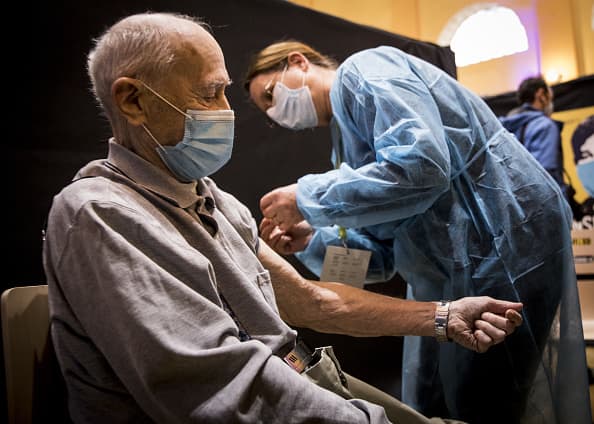A man over the age of 75 receives a vaccine against the Coronavirus (Covid-19) in Strasbourg, France.
Anadolu Agency | Anadolu Agency | Getty Images
Preliminary data showed, today, Friday, that business activity in the euro area fell to its lowest level in two months in January, against the backdrop of tighter closures linked to the Coronavirus.
The region is struggling with increasing rates of Covid-19 infection and tighter restrictions New strains of the virus It spread, causing more economic pain
The Markit composite PMI for the Eurozone, which looks at activity across both manufacturing and services, fell to 47.5 January, from 49.1 in December. A reading below 50 represents a contraction of activity.
Chris Williamson, chief business economist at IHS Markit, said the double-dip recession in the Eurozone appears „increasingly inevitable“.
„The tight restrictions of the Covid-19 virus further affected companies in January,“ he said in a statement.
„Production has decreased at an increasing rate, driven by worsening conditions in the services sector and weak manufacturing growth to its lowest levels so far in the sector’s seven-month recovery.“
President of the European Central Bank Christine Lagarde On Thursday, that The epidemic continues to pose a „grave risk“ For the Eurozone economy.
In addition to the new Covid variants, there are also concerns about a Initiation of slow vaccination Across the European Union.
„In this environment, broad monetary stimulus remains necessary,“ Lagarde said. The European Central Bank decided at Thursday’s meeting Keep interest rates and broader stimulus programs unchanged For now, having consolidated support in December.
The European Central Bank expects the eurozone’s GDP to expand by 3.9% in 2021, and 2.1% in 2022. And that is after a contraction of 7.3% last year. However, these forecasts depend on the evolution of the epidemic.
France is hiring more
Earlier, business activity data in France also came in at its lowest level in two months, reflecting the imposition of stricter curfews across the country. The country’s composite PMI for January came to 47, leading to a contraction.
However, French companies hired more employees in January – the first increase in job numbers in nearly a year.
„The fact that companies are returning to hiring activity indicates some confidence in the economic recovery in the second half of this year,“ Elliott Kerr, an economist at IHS Markit, said in a statement.
In Germany, business activity was able to grow slightly in January, with the Composite Production Index reaching 50.8. However, the reading represents the lowest level in seven months for the European economic engine.
Phil Smith, Associate Director at IHS Markit, highlighted the slower momentum in manufacturing activity in the country, and the ongoing blow to the services sector during January.
„In general, the German economy has made a slow start to the year, and extending the current containment measures until at least mid-February means that this looks like the picture for another few weeks to come,“ he said.
A few days ago, the German government decided to extend the national lockdown until February 14th.

„Organizátor. Spisovateľ. Zlý kávičkár. Evanjelista všeobecného jedla. Celoživotný fanúšik piva. Podnikateľ.“





